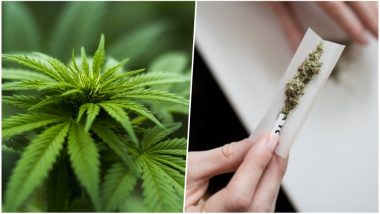South Africa's highest court has ruled to legalise the private use of marijuana in the country. This ruling upholds a lower court's order that found the criminalisation of cannabis was unconstitutional.
In delivering the Constitutional Court's unanimous verdict, Deputy Chief Justice Raymond Zondo on Tuesday declared the law banning marijuana use in private by adults "is unconstitutional and therefore invalid".
"It will not be a criminal offence for an adult person to use or be in possession of cannabis in private for his or her personal consumption," he said in Johannesburg.
The court also ordered the country’s parliament to draft new laws within 24 months to reflect its order. South Africa's government had opposed its legalisation, arguing the drug was "harmful" to people's health.
Three cannabis users who had faced prosecution for using the drug brought the case, saying the ban "intrudes unjustifiably into their private spheres".
It will, however, remain illegal to use cannabis in public, and to sell and supply it. But, the top court says an adult can cultivate cannabis in "a private place" as long as it is for personal consumption in private.
Pro-marijuana activists have cheered the ruling which is a landmark ruling by the country’s Constitutional Court. The Constitutional Court's ruling focuses on the issue of privacy, and a person's right to do as they please in their own home.
But even as rights’ activists are overjoyed at the verdict, the potential implications of the judgment are enormous, and unpredictable. The ruling obviously impacts South Africa’s criminal justice system, which routinely locks up thousands of overwhelmingly poor South Africans for using or dealing in small amounts of cannabis. Weed also forms a huge part of the revenue chain for the country's drug gangs.
South Africa is one of the largest producers of weed, with about 2,500 tonnes of the total of 8,900 tonnes produced — that is 28% of the African production and 7% of the world’s output.
There is most likely no illicit market that benefits South Africa’s poor more than growing weed, despite them raking in only moderate returns compared with the eventual street price of the product. Its cultivation brings in much higher returns than other cash crops for the predominantly poor and remote rural farmers growing it in the Eastern Cape and KwaZulu-Natal.
The UNODC, Interpol and the US Department of State continuously rank South Africa as one of the top producers in the world. South Africa is also one of, if not the largest, exporter of the herb to the UK and Ireland, with large quantities also exported to continental Europe and the East Asian countries.
With its legalisation for personal consumption, the incarceration of poor producers and street dealers could see a drop but the South African government still needs to come up with binding rules based on the order.
(The above story first appeared on LatestLY on Sep 19, 2018 06:06 AM IST. For more news and updates on politics, world, sports, entertainment and lifestyle, log on to our website latestly.com).













 Quickly
Quickly





















